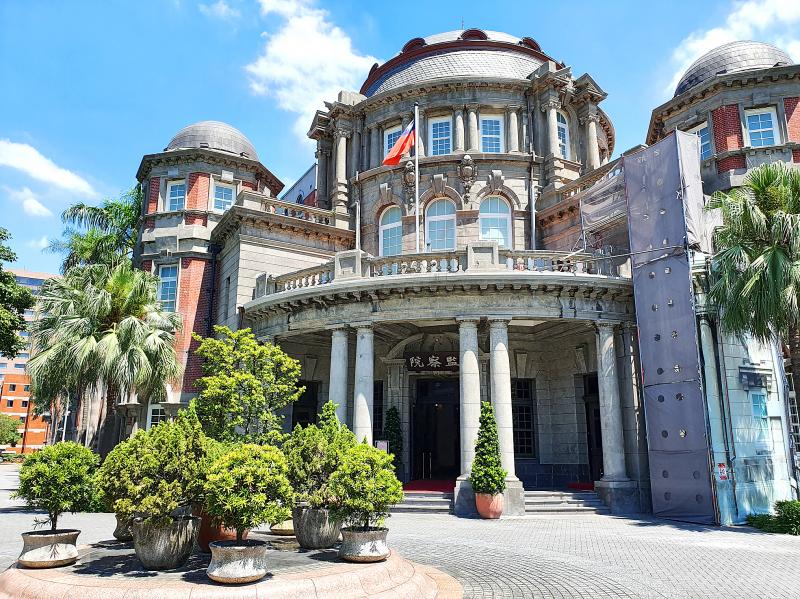The Control Yuan yesterday published data on political party finances from last year, showing more income and expenditure for the Democratic Progressive Party (DPP) than for the Chinese Nationalist Party (KMT).
According to the figures published on the Control Yuan’s public database of political contributions in Taipei, the DPP netted NT$187.46 million (US$6.43 million) and spent NT$190.61 million, while the KMT earned NT$116.61 million and spent NT$117.13 million.
The New Power Party (NPP) made NT$28.82 million and had assets totaling NT$6.2 million, more than triple the NT$1.74 million it had in 2018, the data showed.

Photo: Hsieh Chun-lin, Taipei Times
In its first filing, the Taiwan People’s Party (TPP) netted NT$81.47 million and spent NT$38.9 million, the data showed.
Of the DPP’s earnings, NT$99.69 million came from personal donations, NT$85.27 million from for-profit businesses, NT$714,000 from political donations, NT$1.78 million from anonymous donations and NT$9,067 from other sources.
The party’s account stood at NT$26.94 million, up slightly from NT$20.47 million in 2018.
The DPP spent NT$41.13 million on personnel, NT$34.05 million on business expenses, NT$90,300 on public relations, NT$78.54 million on elections, NT$30.8 million on political campaigns, NT$596,557 on miscellaneous expenditures and NT$5.42 million on donation reimbursements, the data showed.
Meanwhile, NT$63.71 million of the KMT’s income came from personal donations, NT$51.6 million from for-profit businesses, NT$845,000 from political donations, NT$457,961 from anonymous donations and NT$4,086 from other sources, the data showed.
Its account stood at NT$12.64 million, up from NT$3.54 million in 2018.
The KMT’s expenses included NT$47.61 million on personnel, NT$26.11 million on business expenses, NT$256,487 on public relations, NT$16.53 million on elections, NT$20.23 million on political campaigns, NT$732,933 on miscellaneous expenditures and NT$4.79 million on donation reimbursements, while NT$880,000 was paid into the treasury.
In its first year, the TPP netted NT$64.36 million from personal donations, NT$16.5 million from for-profit businesses, NT$300,000 from political donations, NT$312,643 from anonymous donations and NT$403 from other sources, while its total assets stood at NT$52.13 million, the database showed.
As for expenditures, the TPP spent NT$2.38 million on personnel, NT$4.69 million on business expenses, NT$79,915 on public relations, NT$19.73 million on elections, NT$8.5 million on political campaigns, NT$396,413 on miscellaneous expenses and NT$2.45 million on donation reimbursements, while NT$700,000 was paid into the treasury.
Of the NPP’s NT$28.82 million in earnings, NT$64.36 million came from personal donations, NT$597,550 from for-profit businesses, NT$920,000 from political donations, NT$3.53 million from anonymous donations and NT$2.08 million from other sources, the data showed.
The NPP spent NT$15,000 on personnel, NT$8.34 million on business expenses, NT$8.45 million on elections, NT$1.07 million on campaign contributions, NT$200,000 on miscellaneous expenses, NT$270,000 on donation reimbursements and nothing on public relations, while NT$18,748 was paid to the treasury.
The NPP had NT$3.35 million in the bank, in addition to NT$2.1 million in cash, NT$390,000 in bills receivable and NT$355,840 in nonexpendable property for assets totaling NT$6.2 million, its filings showed.
Meanwhile, the New Party made NT$6.68 million in income consisting primarily of NT$4.7 million in personal donations and NT$1.69 million in for-profit business donations, with expenditure totaling NT$6.57 million mainly due to NT$5.47 million in election costs and about NT$950,000 in public relations costs, the data showed.
The party’s account stood at NT$142,854, comparable to the NT$129,972 it had in 2018.

Taiwanese can file complaints with the Tourism Administration to report travel agencies if their activities caused termination of a person’s citizenship, Mainland Affairs Council Minister Chiu Chui-cheng (邱垂正) said yesterday, after a podcaster highlighted a case in which a person’s citizenship was canceled for receiving a single-use Chinese passport to enter Russia. The council is aware of incidents in which people who signed up through Chinese travel agencies for tours of Russia were told they could obtain Russian visas and fast-track border clearance, Chiu told reporters on the sidelines of an event in Taipei. However, the travel agencies actually applied

Japanese footwear brand Onitsuka Tiger today issued a public apology and said it has suspended an employee amid allegations that the staff member discriminated against a Vietnamese customer at its Taipei 101 store. Posting on the social media platform Threads yesterday, a user said that an employee at the store said that “those shoes are very expensive” when her friend, who is a migrant worker from Vietnam, asked for assistance. The employee then ignored her until she asked again, to which she replied: "We don't have a size 37." The post had amassed nearly 26,000 likes and 916 comments as of this

New measures aimed at making Taiwan more attractive to foreign professionals came into effect this month, the National Development Council said yesterday. Among the changes, international students at Taiwanese universities would be able to work in Taiwan without a work permit in the two years after they graduate, explainer materials provided by the council said. In addition, foreign nationals who graduated from one of the world’s top 200 universities within the past five years can also apply for a two-year open work permit. Previously, those graduates would have needed to apply for a work permit using point-based criteria or have a Taiwanese company

The Shilin District Prosecutors’ Office yesterday indicted two Taiwanese and issued a wanted notice for Pete Liu (劉作虎), founder of Shenzhen-based smartphone manufacturer OnePlus Technology Co (萬普拉斯科技), for allegedly contravening the Act Governing Relations Between the People of the Taiwan Area and the Mainland Area (臺灣地區與大陸地區人民關係條例) by poaching 70 engineers in Taiwan. Liu allegedly traveled to Taiwan at the end of 2014 and met with a Taiwanese man surnamed Lin (林) to discuss establishing a mobile software research and development (R&D) team in Taiwan, prosecutors said. Without approval from the government, Lin, following Liu’s instructions, recruited more than 70 software